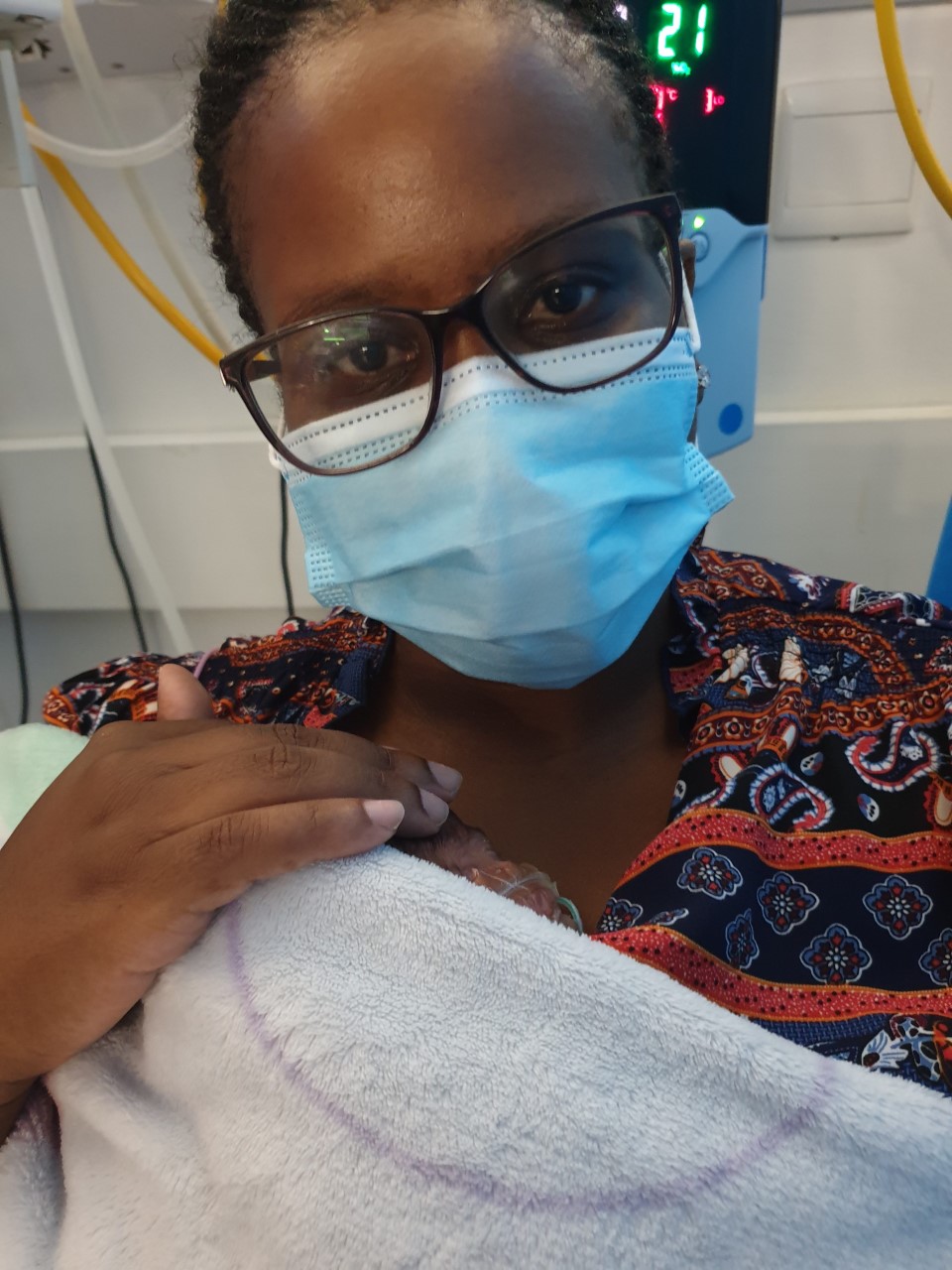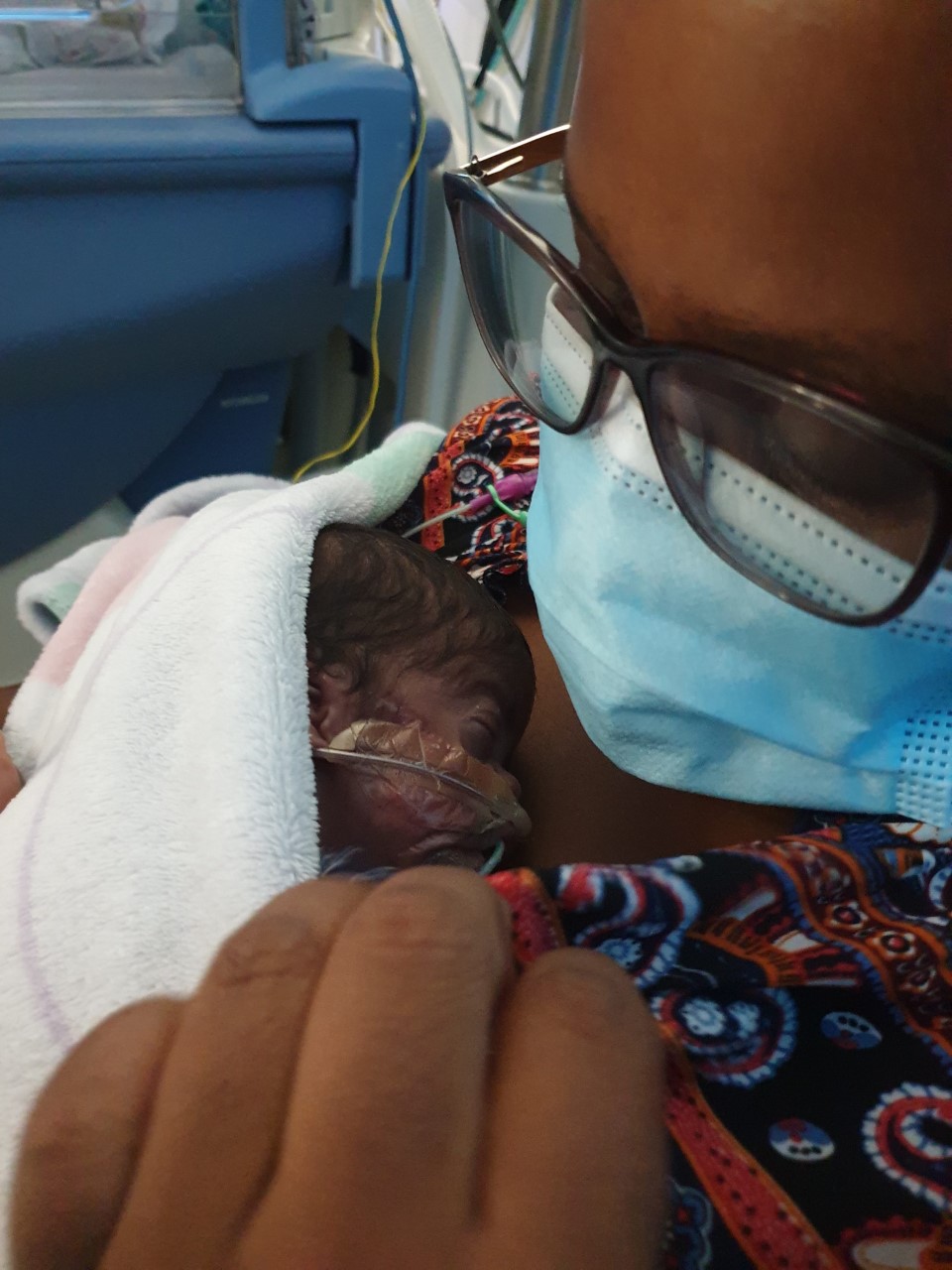A mother whose baby was delivered by emergency C-section at only 25 weeks while she was unconscious and on ventilator support for COVID-19, was overjoyed to meet her baby boy for the first time in the neonatal intensive care unit (NICU) at Netcare N1 City Hospital in Goodwood, Cape Town.
Their emotional meeting followed after the hospital had to search for the mother, who spent a heartbroken Christmas mistakenly assuming her baby had been born too early to survive.
“When they showed me my baby, I was crying because I was so happy, I just couldn’t believe it. He is alive,” Nosipho Nkantini of Eerste River, a professional nurse in the public sector, recalls of meeting her baby on 4 January, some three weeks after he came into the world on 17 December.
“It was like a miracle, and I have decided to name him Oyena, which means ‘the one chosen by God’.
In early December, when she was only about halfway through her pregnancy, Nosipho developed symptoms of COVID-19. She contacted her general practitioner, who initially did not suspect she had the virus and instead prescribed antibiotics.
“I went for a pregnancy check-up, and I suddenly felt very short of breath. I had a rapid COVID-19 test, and it came back negative. Still, I couldn’t breathe and it was terrifying. I couldn’t have X-rays or certain treatments for my symptoms because I was pregnant. My second COVID-19 test came back positive.”
She was transferred to Netcare N1 City Hospital and soon after arrival lost consciousness and was placed on a ventilator in the hospital’s ‘red’ zone dedicated to the care of COVID-19 positive patients. “From then I can’t remember anything until I woke up days later, when I was told that I had suffered complications and my baby had been delivered by emergency C-section,” Nosipho says.
“They told me my baby is in the NICU, but I was so overwhelmed. Apart from the fact that I was still very weak recovering from COVID, I previously lost a baby who was delivered at 28 weeks, so I was extremely traumatised imagining this happening again.”
When Nospiho was well enough to be discharged, her baby still required highly specialised life support and care in the NICU. Unfortunately, during her emergency admission, the contact details for Nosipho and her next-of-kin were outdated and efforts to reach her became increasingly urgent.
Social worker Ronel Grobler was enlisted to assist in reaching the baby’s mother, but the festive season added to the difficulties as they reached out to doctors and their staff – many of whom were on holiday – in an attempt to get hold of her. “We were very concerned about Nosipho, and when all else failed we contacted the local police, who promised to assist us in the search.”
Meanwhile, Nosipho was in despair. “At home, I was too scared to phone the hospital because I had convinced myself my baby had died, and I couldn’t bear to have my worst fears confirmed. Christmas without him was terrible, I was so, so stressed,” Nosipho says.
“When the police arrived at my home, I thought they were coming to tell me that my baby had died. I could not believe it when they told me my baby boy is fine and he is waiting for me in the hospital. It was such a big relief, and afterwards the police said, ‘we didn’t mean to scare you’.”
Dr Ricky Dippenaar, a neonatologist who practises at Netcare N1 City Hospital, says that Nosipho’s baby boy – who at that stage had yet to be named – was very much alive, although he was born so prematurely. “Initially, he had a bit of a stormy course, as he was born at only 25 weeks’ gestation, and also because his mother had been so ill with COVID-19 while he was in the womb.”
“Thankfully the tiny baby tested negative for COVID-19, which is often the case with babies born to COVID-19 positive mothers, however, the mother’s COVID can still impact the unborn baby. He has made good progress, and is taking full feeds and continues to gain weight.”
Dr Dippenaar explains that many mothers whose babies need to be cared for in a NICU environment experience ‘double separation’. “Double separation is when the mother cannot hold her baby and can no longer feel the baby inside her. Psychologically this is very tough, and in this case, it was further compounded by the mother’s history and traumatic COVID-19 experience.”
After Nosipho completed her isolation period for COVID-19 she was finally able to see her baby for the first time on 4 January. “I was so happy but at the same time it was very difficult not being able to hold him at first. The staff in the NICU were saying he’s a miracle baby, and we hope that he will soon grow strong enough so take him home.”
“I am so grateful to all the doctors and the hospital staff who cared for my baby and I, and for bringing us together. As a healthcare worker myself, I am especially thankful to all who are on the frontline of caring for people with COVID-19, and I owe my life to them.”
She extended special thanks to gynaecologist Dr Bedwill Jentel, physician Dr Chris Greyling, neonatologist, Dr Dippenaar, paediatric intensivist Dr Shetil Nana and the neonatology team at the hospital. She and the social worker both expressed appreciation to the Kleinvlei Police Station for their prompt assistance and their vital role in uniting mother and child.
Nosipho appealed to the public to take COVID-19 seriously and do everything possible to prevent its spread. “I am a professional nurse, and as I was at high risk for severe COVID-19 because I am diabetic, my employer moved me to an office role, where I was part of the tracking and tracing team assisting COVID-19 patients and their contacts to help fight the spread of the coronavirus,” Nosipho says.
“This virus moves so fast, and it can have devastating effects. By the time someone in the family becomes sick, often the virus has already infected their loved ones and the people around them. COVID-19 is real, and we must protect each other by following all the precautions.”



